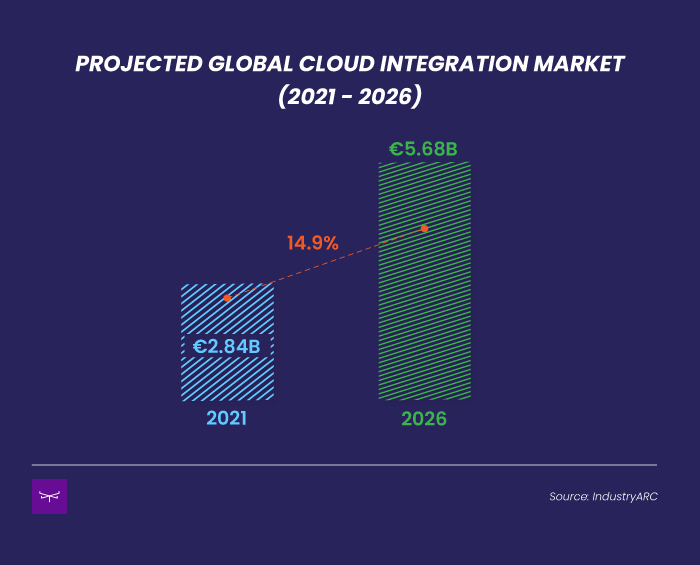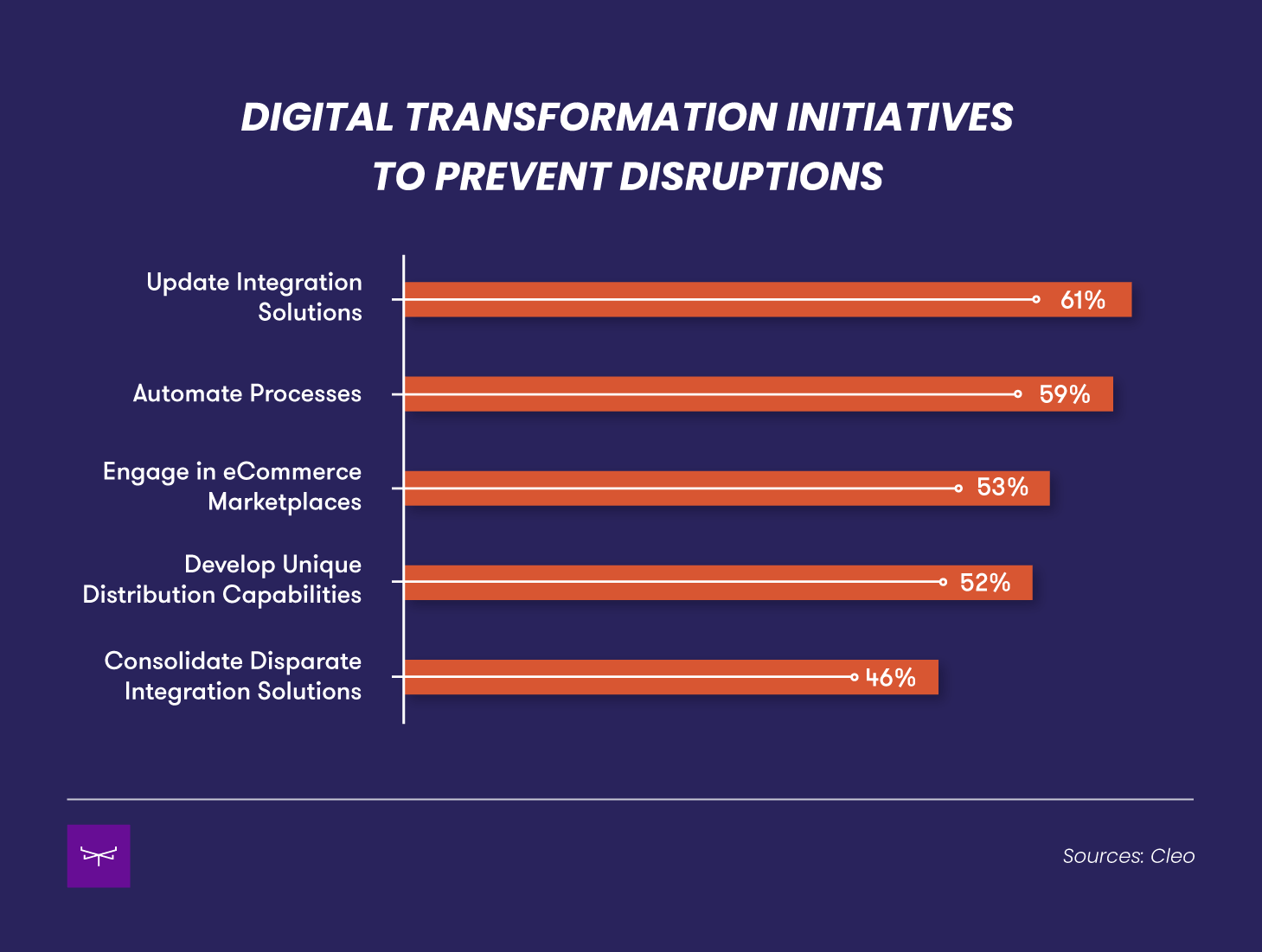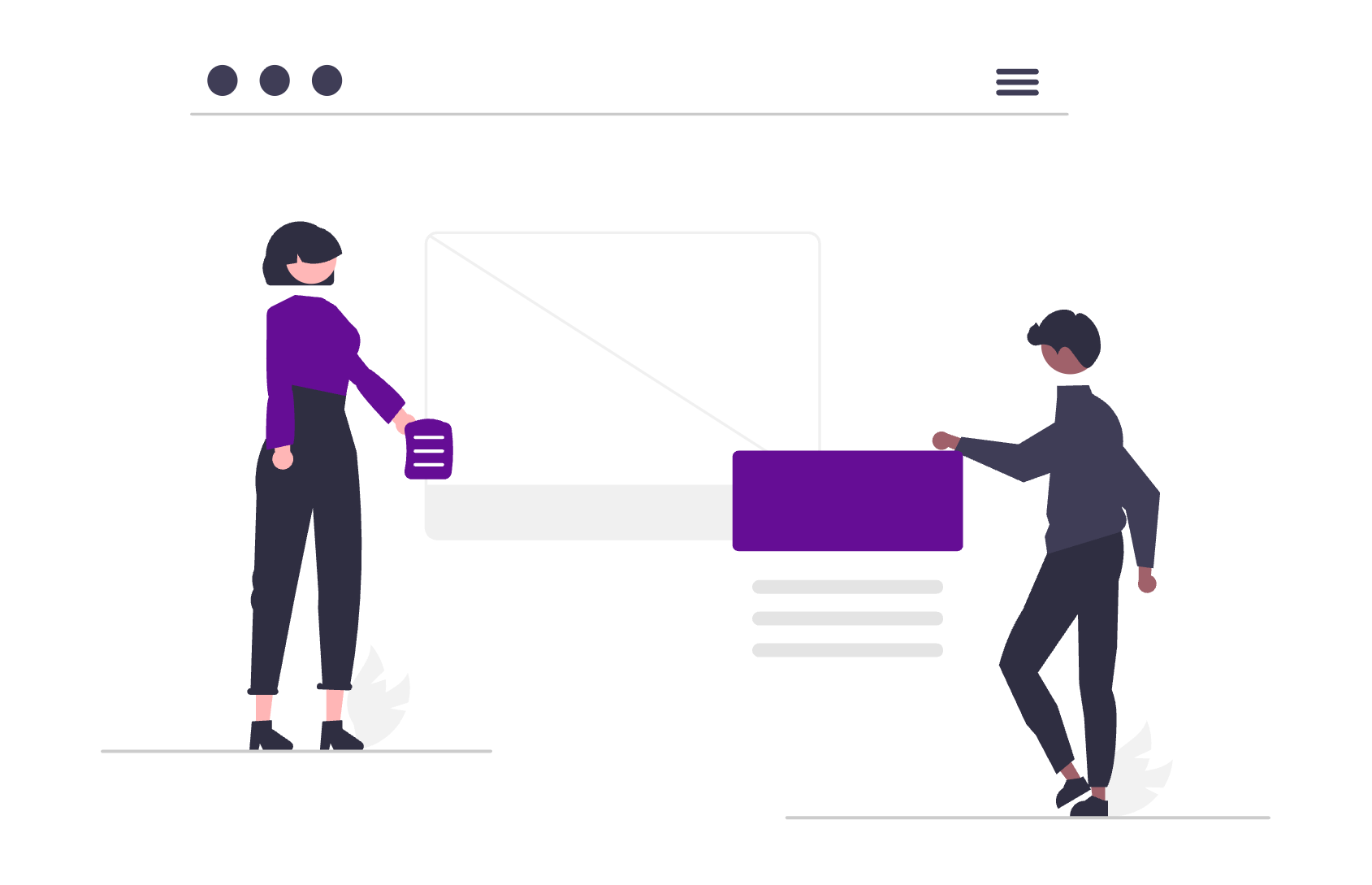Improving Supply Chain Resilience Through B2B Cloud Integration
The Covid-19 pandemic has been a real wake up call for many B2B companies, with many of them having to start sourcing more locally rather than relying on global trading partners to fulfil their demand. In addition, it also revealed that companies do not have sufficient visibility into what is really happening in their supply chains due to shortcomings of integration technology. In fact, research shows that even though 90% of companies agree that end-to-end visibility is important, just 50% of companies can access supply chain information to obtain business insights.
While the world witnessed a digital transformation as a result of the e-commerce boost, many companies found themselves reevaluating their B2B integration strategy — as a means to adjust to the new market conditions.
“Digitalization of business and cloud integration initiatives are not new to B2B organizations, but in 2020, the pandemic shined a light on how important these initiatives are to revenue growth – and for some, survival”, said Tushar Patel, CMO of Cleo. Unsurprisingly, the Global Cloud Integration Market is expected to see tremendous growth over the next few years. In fact, it is estimated that the market will grow at a CAGR of 14.9% between 2021 and 2026, surpassing the €5.68B mark by 2026.
Patel further explains that “organizations have gained a new perspective on how important modern integration platforms are to dynamically respond to market conditions, whether those are new revenue opportunities or supply chain disruptions. This shift in mindset and urgency accelerated the adoption of ecosystem integration. We expect this trend will continue for years to come.” With the urgent need to dynamically respond to market change, centralising your operational processes through B2B cloud integration is absolutely essential — especially considering the complex nature of supply chains.
Let’s have a look at 5 ways in which B2B cloud integration can help create more resilient supply chains:
5 Ways B2B Cloud Integration Can Improve Supply Chain Resilience
Considering the large number of companies that have experienced supply chain disruptions during the pandemic, it is only natural that so many of them are in agreement with the vital need for digital transformation. In fact, as they are starting to better understand the value of cloud integration, 90% of B2B companies are eager to immediately change their way of doing business with their ecosystem. As a result, more and more companies are starting to invest in digitisation solutions to manage and automate their operational processes — including the implementation of cloud-based solutions.
More specifically, this shift in perspective has empowered 66% of companies to increase their digital capabilities through, for example, e-commerce and adopting digital supply chain technologies as a means to improve their supply chain resilience. Approximately a third of companies are now targeting new audiences and have created new lines of business. In addition, 30% of companies have created new business models, with 32% focusing on customer loyalty programs and 25% shifting to a direct-to-consumer model. Let’s have a look at how exactly B2B cloud integration plays a role in bringing about such change.
“Today, everybody is using outdated information, and when problems occur, everybody is informed far too late”, says Erwin Verstraelen, CDO and CIO at the Port of Antwerp. In fact, research shows that just 45% of companies are currently using real-time data insights to make more informed decisions. However, this number will likely increase soon as 44% of companies plan to integrate real-time data flows in the next two years.
Verstraelen highlights that “there is a need for real-time data to start orchestrating entire supply chains”. Evidently — as it improves real-time visibility and provides businesses with performance data and critical business insights — B2B cloud integration is essential for controlling data flows throughout the entire supply chain network. This helps them uncover new opportunities and enables managers to make more informed decisions.
More specifically, the integration of end-to-end data flows helps automate data orchestration and transformation as well as the streamlining of end-to-end data lifecycles, thereby enabling more accurate inventory management, timely workflows, and controlled costs. In addition, automating your core processes helps reduce the risk of human error due to manual workflows and allows them to focus on more valuable tasks instead.
“At the core of any effective digital ecosystem lies a wide diversity of applications that require modern integration solutions — both inside and outside of the organisation. According to Cleo, the top 10 integrated applications in supply chains are:
- Customer Relationship Management (46%)
- Data Analytics Tools (46%)
- Online Marketplaces (43%)
- Warehouse Management System (43%)
- E-commerce Technology (42%)
- Transportation Management System (38%)
- Supply Chain Visibility Platform (38%)
- Enterprise Resource Planning (38%)
- Fulfilment System (35%)
- Third-Party Logistics (33%)”
Furthermore, B2B cloud integration enables businesses to combine their cloud applications and on-premise systems in one place, allowing for data and analytics sharing between multiple systems, workers, partners, and customers. Robust B2B functionality is of the utmost importance for connecting various cloud infrastructures, however, keep in mind that a B2B integration platform should not only support systematic workflows, but also cooperative and data-driven ones.
2. Increasing Supply Chain Agility & Visibility
It goes without saying that today’s economy is uncertain and unpredictable. Therefore, it is becoming increasingly important for companies to optimise their supply chains so that they can effectively manage and overcome market challenges. A strong focus on supply chain agility and visibility is needed to stay ahead of the game and ensure rapid strategic response when required.
“Visibility, traceability, and interoperability are essential to connected, agile and more resilient supply systems now and well beyond the immediate COVID-19 crisis.”
These days, businesses all around the world are empowered to automate their key business processes in order to close visibility gaps and be adaptable to new integration technologies. In fact, more than 50% of companies strongly believe that improving their visibility into key business processes could help them to mitigate.
There clearly is a lot of room for improvement when it comes to supply chain visibility. As shown above, 54% of 1.7K companies have no visibility into their supply chain at all, whereas 81% said to only have visibility to a certain extent. However, 64% of companies are now improving their supply chain agility and visibility as an integration initiative to improve their customer experience.
By centralising all applications and processes in one place, B2B cloud integration ensures real-time visibility, end-to-end transparency, and access to important data at all times as well as the seamless adoption of any new tools or technologies — especially cloud-based solutions. Not only does this provide businesses with intelligent decision-making capabilities, but it also increases their operational efficiency and flexibility and makes it easier for businesses to achieve scalability.
“Interoperability Is a Key Factor for B2B Cloud Integration.
The lack of interoperability in the robotics industry calls for a universal solution — especially considering the benefits that come with the integration of interoperable systems, e.g. optimised efficiency across the entire supply chain, more accurate inventory management, and a safer workplace.
Did you know that 18.8% of businesses believe that interoperability between different clouds is the main benefit of hybrid cloud computing?
For more details, please check out our industry report “Robotics Interoperability”, where we dive into:How interoperability can tackle communication problems Trends that are shaping the future robotics industry Opportunities and challenges in the global robot market A case study about interoperability at a Danish Hospital”
3. Preventing Further Disruptions
Research shows that 99% of the companies surveyed said that they rely on technology to ensure the continuity of their business as well as to prevent further disruptions. Moreover, every single one of the companies that took part in the survey said that they have committed to digital transformation initiatives.
Updating integration solutions (61%) turned out to be the number one strategy that companies are considering using as a way to approach digital transformation. In addition, with an impressive 49%, adopting a B2B cloud integration strategy is amongst the most popular new technologies companies consider adopting.
Other popular technologies include artificial intelligence, machine learning, and advanced analytics. The adoption of these technologies — especially in combination with the strategies mentioned above — allows for a better understanding of your operations as well as the market itself, thereby helping companies to prevent and prepare for possible disruptions.
With its ability to provide real-time visibility into operational processes, B2B cloud integration allows businesses to predict more accurate forecasts, potential disruptions, and surges in demand, while simultaneously increasing operational efficiency and boosting sales.
Onboarding is central to any type of multi-enterprise ecosystem and helps to understand which underlying integration issues are causing problems in today’s supply chains. According to 93% of surveyed companies, the issues that arise in their supply chains are caused by integration challenges. These include limited data visibility (36%), the lack of API integration capabilities (36%), and slow partner onboarding (34%).
The onboarding of new business partners — such as suppliers, carriers, or customers — can get very complex and technologically challenging depending on the maturity of the company’s B2B integration solutions. In order to manage a healthy digital supply chain, it is essential to identify and address any possible integration technology issues.
Seamless onboarding is a great contributor to a company’s performance. In fact, 62% of survey respondents agree that the onboarding process should take no longer than seven days, and preferably less. As shown in the image above, 39% of companies surveyed still require more than a week — and in some cases even more than a month — to onboard new partners.
Considering the many different parties that are part of a supply chain ecosystem, both partner onboarding and internal communication in general are of great importance. This is where B2B cloud integration can be especially useful. Not only does B2B cloud integration eliminate technological integration challenges, but its ability to collect all relevant data and information in one place also simplifies and improves the communication and collaboration with partners, suppliers, customers, and workers — including labour and process management.
Moreover, B2B cloud integration can manage any kind of process from anywhere in the world. Compared to the installation and configuration efforts that come with traditional models, a cloud-based solution allows for quick, seamless integration and is ready to be used almost instantly. In addition, cloud environments offer increased flexibility to scale your business while keeping maintenance costs at a minimum and offering integration with any type of cloud-based solution.
Not only has the pandemic urged companies to diversify their sourcing strategy, but it has also empowered them to build stronger relationships within their ecosystem — e.g. suppliers, trading partners, customers. According to Aldus von der Burg, our CEO at Meili Robots, “system providers and operators need to find ways to appease” the market’s demand, “which is very difficult to do alone. Hence, there will be a substantial growth in collaborations where companies provide unique solutions to the supply chain machine rather than one giant solution to cover all”. Evidently, ecosystem partnerships are essential to ensure supply chain resilience and better preparedness for market disruptions.
As mentioned before, by providing end-to-end visibility, B2B cloud integration addresses the unpredictability of the supply chain ecosystem. In fact, companies are becoming increasingly aware of the shortcomings of their current solutions. They understand that there is a need for a cloud-based integration solution that not only fulfils today’s need for supply chain agility, but that also enables them to easily automate their processes in response to unpredictable disruptions — e.g. the pandemic — as well as market opportunities — e.g. the e-commerce boost.
Moreover, with its ability to dynamically sense and intelligently respond to change, B2B cloud integration is a great contributor to building trust and confidence among the various partners within a business’ ecosystem — especially as businesses are starting to adopt more and more automation solutions to their operations. Empowering businesses to adopt such emerging technologies to their ecosystem, the cloud can, in fact, reduce the supply chain’s carbon emissions by 5-10%, while also improving resource efficiency, risk mitigation, and regulatory compliance.
“If you are interested in knowing more about digital technologies in today’s supply chains, I would highly recommend one of our previous blog posts where we discuss a range of technologies and how they help build more sustainable supply chains:
Sustainable Supply Chains in the Era of Industry 4.0”
Final Thoughts
A resilient supply chain is a connected supply chain that has a strong focus on three goals: supply chain visibility, demand-driven supply, and supply chain optimisation. B2B cloud integration enables you to centralise all of your tools and systems — whether cloud-based or on-premise — in one place, providing you with a comprehensive overview of your supply chain. This way, you will be able to get an in-depth understanding of your operational processes, thereby improving forecasting accuracy as well as the collaboration with your partners.
And, the same goes for our cloud-based fleet management solution: by having a comprehensive overview of your entire robot fleet, you will be able to make your processes more efficient and profitable.
About Meili Robots
Meili Robots is developing the next-generation of mobile robots fleet management, called Meili FMS. A universal digital solution, an all-in-one platform that is capable of handling different kinds of Autonomous Mobile Robots (AMRs) and Automated Guided Vehicles (AGVs). Enable traffic control, empower interoperability and facilitate automated task allocation — all via intuitive UI. Check our website meilirobots.com/product to learn about our products. Contact us to find out more: info@meilirobots.com.














